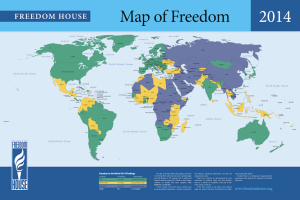In order to formulate a clear answer for the question presented, it is important to draw the limits of the terms democracy and development because there is not only one type of democracy and in the same way there are different paths for development.
 A very famous statement from Abraham Lincoln in the Gettysburg Address (1864) reads: government of the people, by the people and for the people. This definition of democracy goes beyond the actual meaning of the word itself (rule by people). Taking in consideration Lincoln’s suggestion, it is essential to point out that people is the key feature of democracy and implies political equality and equal distribution of political power and influence. It also emphasise the importance of popular participation and therefore this participation should be done in the public interest (Andrew 2000).
A very famous statement from Abraham Lincoln in the Gettysburg Address (1864) reads: government of the people, by the people and for the people. This definition of democracy goes beyond the actual meaning of the word itself (rule by people). Taking in consideration Lincoln’s suggestion, it is essential to point out that people is the key feature of democracy and implies political equality and equal distribution of political power and influence. It also emphasise the importance of popular participation and therefore this participation should be done in the public interest (Andrew 2000).
However when talking about participation it becomes necessary to mention the different types of democracy.
As the purest way of participation in terms of democracy, it can be found direct democracy. This specific type places all power in the hands of the individual. Each person is treated as an equal, and each person is given a chance to directly influence the policymaking process. Direct democracy can be found in ancient Athens where every male rich citizen was able to attend and debate about issues that affected them directly. Nowadays is it almost impossible to have this kind of system if is not in small communities and in a more reduced scale.
A second type of democracy would be Representative Democracy where the political arrangement establishes an intermediary political actor between the individual and the policy outputs of the state. A person or a group is elected to develop the activity of representing the ideas of the people that voted for them (The Saylor Foundation 2014).
But how is direct and representative democracy linked to development?
According to the Freedom House Index (2012), the criteria that a country needs to achieve to meet democracy begins with free and fair elections, political pluralism and participation, political rights, civil liberties, rule of law equal to all citizens and associational and organizational rights.
 The case of Switzerland would be for instance a reflection of how democracy brings development. Despite the fact that there are three different official languages within the country, the great variety of ethnic groups and close to 20 per cent of the resident population is foreign, the Swiss have been able to keep crime and social tension very low, bringing cohesion to a high level. Switzerland death rate in 2014 was 4 over 1.000 people with a women life expectancy of 85 years old and men of 81 (World Bank 2012).
The case of Switzerland would be for instance a reflection of how democracy brings development. Despite the fact that there are three different official languages within the country, the great variety of ethnic groups and close to 20 per cent of the resident population is foreign, the Swiss have been able to keep crime and social tension very low, bringing cohesion to a high level. Switzerland death rate in 2014 was 4 over 1.000 people with a women life expectancy of 85 years old and men of 81 (World Bank 2012).
When talking about the Swiss political organization it is important to mention its semi-direct democracy system. The Swiss reliance on, and affection for, local government has generated, “a great variety of institutions based on democratic principles than any other country”. It is the fact that the extent to which Switzerland has placed a unique degree of faith in the people. Through its use of initiative and referendum at the national level, its citizen-based legislature, and similar devices, the Swiss have contributed to the creation of a different kind of democracy (Gregory 2005).
An example of how democracy does not encourage development can be found in India. Data from the World Bank (2011) pictured India with a 5.1 per cent of the population living with a $1.25 per day. It does not sound extremely negative if it is compared to countries such as Guinea with a 12.7 per cent in 2012 or the 10.4 of Ethiopia in 2011. The only difference is that those two last countries are not democratic.
As a representative democracy, Indian citizens are allowed to vote to the candidates that will represent them in the government but in this particular case the elected representatives do not act on behalf of the interest of those who voted for them. Ineffective government is linked to the fact that periodic elections are not strong enough as a tool to affect the power of the elites. In terms of legitimacy in a democratic system, Seymour Martin Lipset (1959) stated that legitimacy involves the capacity of a political system to engender and maintain the belief that existing political institutions are the most appropriate or proper ones for the society. It can be agreed that India is a democratic country, but at what cost? Is that democracy bringing development? How legitimate is Indian democracy? Can it be called development when the system impedes the welfare of its people?
So far the two cases of study presented were democratic, one of them showed development through democracy but the other did not. What occurs when there is no democratic but authoritarian system instead? Can authority bring development to a country?
 Rwanda as an authoritarian country has decreased poverty in a million of people from 2006 with a ratio of 56.7 per cent to 44.9 per cent in 2011. Nearly 815.000 tourists visited the country in 2012 according to the World Bank database (2011), showing improvements in services and security policies. Infant mortality has also been reduced from 120 deaths per 1,000 live births in 1998 to fewer than 40 in 2012 and a 24% of the total government expenditure went to health and 17% to education in 2011. These percentages from the World Bank seemed to proof that development does not need of a democratic system to happen. But looking at the whole picture, what is understood by development? Ibrahim F.I.Sihata (1997) stated that development in the broad sense covers all forms of human progress and the enjoyment of a better quality of life. It is not limited to the material betterment of economic conditions (e.g. higher per capita income) or better physical standards of living; it covers human progress in all its aspects, including fair distribution of the fruits of growth and political rights under a form of government based on broad participation.
Rwanda as an authoritarian country has decreased poverty in a million of people from 2006 with a ratio of 56.7 per cent to 44.9 per cent in 2011. Nearly 815.000 tourists visited the country in 2012 according to the World Bank database (2011), showing improvements in services and security policies. Infant mortality has also been reduced from 120 deaths per 1,000 live births in 1998 to fewer than 40 in 2012 and a 24% of the total government expenditure went to health and 17% to education in 2011. These percentages from the World Bank seemed to proof that development does not need of a democratic system to happen. But looking at the whole picture, what is understood by development? Ibrahim F.I.Sihata (1997) stated that development in the broad sense covers all forms of human progress and the enjoyment of a better quality of life. It is not limited to the material betterment of economic conditions (e.g. higher per capita income) or better physical standards of living; it covers human progress in all its aspects, including fair distribution of the fruits of growth and political rights under a form of government based on broad participation.
For Amartya Sen (1999) Development requires the removal of major sources of un-freedom: poverty as well as tyranny, poor economic opportunities as well as systematic social deprivation, neglect of public facilities as well as intolerance or over activity of repressing states.
On the contrary of the case of an authoritarian system as the Rwandan, where participation in the political decisions is very limited and choices are made by the government in power and especially by the head of the state; democracy contributes to development through tools such as political liberties, the right to decide limiting the abuse of executive power, in order to provide sanctions to those who deprive the development of a country.
As shown in the cases of study, the lack of political liberties in authoritarian regimes is due to the assurance of economic growth and security from the leader or government. However human development is implemented in democratic countries and is a key component of development as a whole: civil liberties, freedom for association and political pluralism. Democracy brings development in some aspects but might be lacking of in some others.
 There is no right or wrong answer for the question of this essay, in the same way as democracy is not a prescription to solve the problems of a country. Like Robert Alan Dahl (1989) said: “a one size fits all model” of democratization for development can never be applied.
There is no right or wrong answer for the question of this essay, in the same way as democracy is not a prescription to solve the problems of a country. Like Robert Alan Dahl (1989) said: “a one size fits all model” of democratization for development can never be applied.
As a closing statement, a quote from Adam Michnik (1996) giving his personal view regarding the power of democracy as a tool of development: Democracy is neither black or red. Democracy is gray…it chooses banality over excellence, shrewdness over nobility, empty promises over true competence… it is eternal imperfection, a mixture of sinfulness saintliness and monkey business. This is why the seekers of a moral state and of a perfectly just society does not like democracy. Yet only democracy, having the capacity to question itself, also has the capacity to correct its own mistakes.


Reblogged this on bobOnline.
LikeLike
Reblogged this on Sites In India.
LikeLike